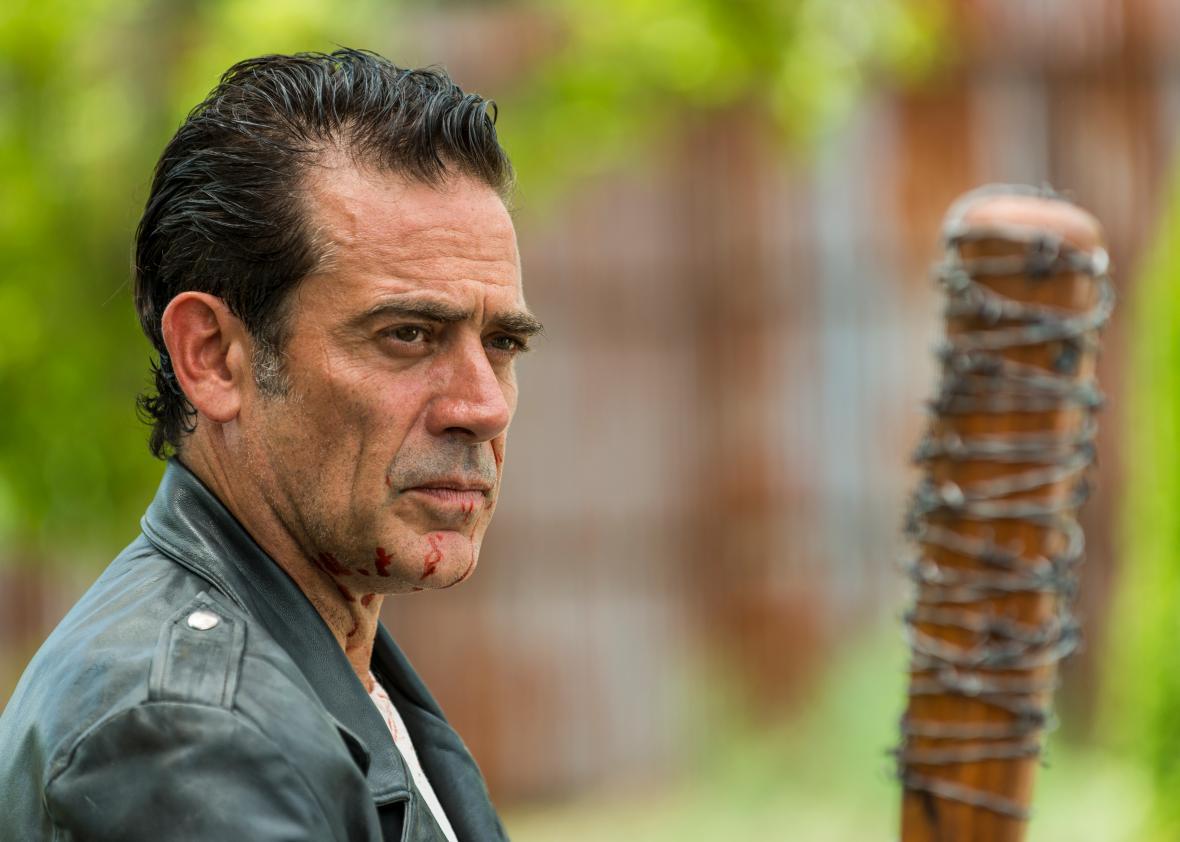The addition of Jeffrey Dean Morgan’s Negan, a beloved (and/or be-hated, depending on whom you ask) comic-book villain making his long-awaited TV debut, should have given The Walking Dead a shot in the arm. The seventh-season premiere, in which Negan and his barbed wire–wrapped baseball bat turned two of the show’s beloved characters into bloody pulp, was the second-highest-rated episode in the show’s history, with an estimated audience of over 17 million viewers, and set the stage for an epic showdown between Negan’s Saviors and Rick’s survivors, who were down but assuredly not out.
Instead, The Walking Dead has, both creatively and rating-wise, walked right off a cliff. The audience numbers plummeted after the season premiere, from 17 million to under 12.5, and kept dropping, reaching the show’s lowest point in more than four years. (Numbers for last night’s midseason finale are still being calculated.) After the extraordinarily gory deaths of Michael Cudlitz’s Abraham and especially Steven Yeun’s Glenn, who had been with The Walking Dead since its very first episode, social media lit up with fans proclaiming they’d never watch another episode, and while that’s not the first time they’d made such a threat, this time they apparently followed through.

Wikipedia
The Walking Dead has never been a great series; it’s Peak TV at its lowest ebb, junk food for the diet-conscious. You never come away from an episode talking about how well-written or well-directed it was, and it doesn’t stand up to the kind of analysis that viewers and critics lavish on Westworld or The Americans. But it has been at times a show that where all the pieces fit together just as they should, one that’s involving enough that it doesn’t need to be interesting. In the seventh season, though, it’s gone horribly off course, scattering its characters to the four winds for a series of largely disconnected episodes that regularly slopped over their allotted length, despite the fact that little if anything significant was happening. The willingness of networks like AMC and FX to let their creators stretch the boundaries of TV’s cookie-cutter formatting has largely been a positive development, but as The Walking Dead ran over time week after week, its supersized episodes started to feel less like the product of creative freedom than a simple land grab—not unlike AMC’s practice of shifting from the standard 13-episode season to a 16-episode season split into two discrete halves.
The first half of The Walking Dead’s seasons have often been the better ones, but in Season 7, the show was clearly spinning its wheels, killing time until the survivors made the inevitable decision to fight back against Negan rather than subsist under his thumb. Each episode took on a different group of characters in a different setting—Alexandria, the Hilltop, Oceanside—to show how various communities had adapted to living under the Saviors’ tyrannical rule. But after a couple of iterations, it became clear that these were at best minor variations on a theme. The Walking Dead was walking in circles, and there aren’t enough interesting characters remaining to make that repetitive journey worthwhile.
Some part of the waning interest in The Walking Dead can be chalked up to changing circumstances: With a capricious authoritarian about to take power in the U.S., a fictional embodiment of toxic masculinity building his own miniature fascist state is no longer just a dark fantasy to be indulged on Sunday nights. (The lengthy preview for War for the Planet of the Apes that aired during the midseason finale likewise plays very differently now, with its apocalyptic warnings about humanity’s last chance to save itself from being overrun by a competing species.) But given that Donald Trump’s campaign specifically identified The Walking Dead’s audience as one receptive to its alarmist messaging on illegal immigration, it’s not clear that a turn towards authoritarianism would repel them in significant numbers.
Even for the Neganites in the audience, though, the the character may have started to wear thin. Despite Jeffrey Dean Morgan’s best efforts to give him life, Negan turned out to be something of a paper tiger, a terrifying badass reined in by the fact that the show only has so many characters it can kill. Over the course of the season, both Carl and Rosita tried to assassinate him and failed, but he let both of them live, instead turning his wrath on the weaselly Spencer, whom no one was sorry to see go, and the hapless Olivia, whom we barely knew well enough to mourn. (One of The Walking Dead’s most insidious characteristics is the way it’s trained its audience not to sympathize with characters who appear weak or vulnerable, since we know they’re eventually going to get killed off.) The more we’ve seen of Negan, the less frightening he’s become. Like most horror-movie monsters, he’s far less scary in the light.
The midseason finale set up a second half that will apparently be devoted to a massive counterattack on the Saviors, which could provide the season with the jolt it desperately needs. But as of now, Negan might as well have taken a bat to The Walking Dead itself. The show’s not dead, but it’s barely breathing.
